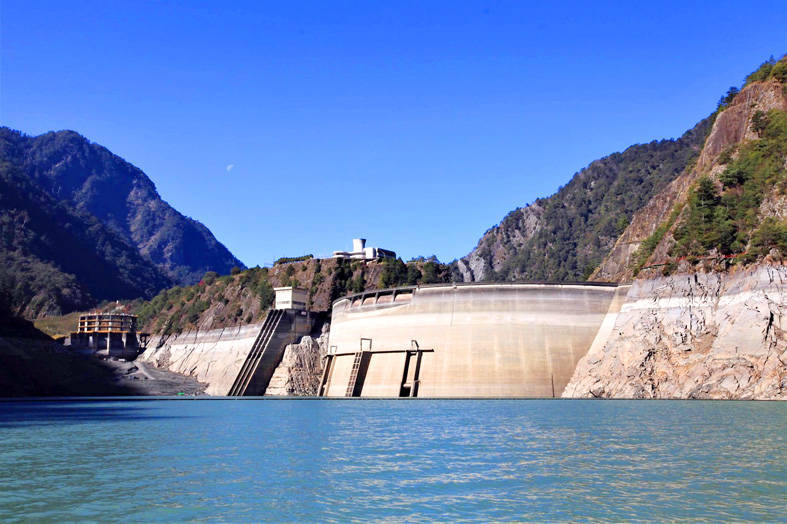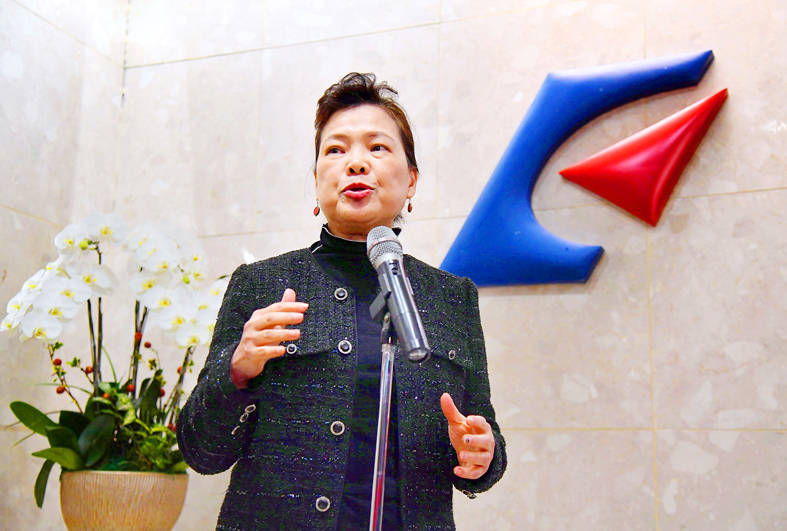《TAIPEI TIMES》 Ministry exploring all water options

The Deji Reservoir in Taichung is pictured yesterday. As of 12pm yesterday, the water level at the reservoir was at 10.19 percent of capacity, Water Resources Agency data showed. Photo: CNA
ALTERNATIVES: All options, including wells, desalination and water reclamation, would be looked into, as six reservoirs saw water levels drop below 20% of capacity
By Angelica Oung / Staff reporter
After a typhoonless year and an unusually dry spell in the first quarter, Taiwan is counting on alternative sources of water to ensure a steady supply until the arrival of the wet season, Minister of Economic Affairs Wang Mei-hua (王美花) said yesterday.
Wang also defended the ministry’s strategy of proactively developing emergency wells to increase the nation’s water supply, including granting permission to companies in the Hsinchu Science Park (新竹科學園區) to drill wells.
No possible alternative source of water will be overlooked, including wells, desalination and water reclamation, she said.
“This is undoubtedly the most serious drought since 1967,” Wang told a press briefing. “We usually get an average of more than 100mm of spring rain, but so far this year, we only had 20mm,” she said.
Spring rain refers to rainfall from February to April.
“The reason we still have water now is because we have been prepared,” she said. “We have increased our backup water supply and used pipelines to transport water where it is needed.”
Wang’s remarks came after water levels in six reservoirs across the nation fell below 20 percent of capacity, despite rainfall in the past few days.
As of 12pm yesterday, the water levels at Baoshan Second Reservoir (寶二水庫) in Hsinchu County, as well as Yongheshan Reservoir (永和山水庫), Mingde Reservoir (明德水庫) and Liyutan Reservoir (鯉魚潭水庫) in Miaoli County, were at 12.43 percent, 11.81 percent, 10.64 percent and 15.08 percent of capacity respectively, while Deji Reservoir (德基水庫) in Taichung and Zengwen Reservoir (曾文水庫) in Chiayi were at 10.19 percent and 15.22 percent of capacity, figures from the Water Resources Agency showed.
Wang said the government has spent NT$1.96 billion (US$69.25 million) on drought-prevention measures since 2018 amid concern over climate change-related extreme weather patterns.
The nation’s 1,200 emergency wells were surveyed and 87 new wells were dug, while 160 emergency wells are currently in use, she said.
A pipeline also carries water from Taoyuan to Hsinchu, where the water situation has reached “orange alert” levels and water pressure has been reduced around the clock, she said.
Some have said that relying on wells is a shortsighted solution that could have unintended consequences.
Former minister of the interior Lee Hong-yuan (李鴻源) said on TV that it could cause land subsidence.
“The science park uses at least 200,000 to 300,000 tonnes of water a day,” Lee said on the Direct Interaction Live (互動直播LIVE) program. “What if satisfying this supply with groundwater causes land subsidence? Would it damage precision manufacturing equipment in the park? Who will take responsibility for the possible consequences?”
Wang said the request to drill more wells came straight from the Hsinchu Science Park firms and only wells in areas with “plentiful groundwater supply and without risk of subsidence” would be approved.
Emergency wells in Hsinchu would only be used to cover an emergency shortfall rather than for daily use, Water Resources Agency Deputy Director-General Wang Yi-feng (王藝峰) said.
Once approved, an emergency well would take about 50 days to dig, he said.
As climate change causes extreme weather patterns, Taiwan’s long-term plan to increase its backup water supply goes beyond wells, Wang Yi-feng said.
“We have 11 water reclamation projects that are ongoing. We expect at least one new facility to come online every year,” he said.
Currently, only one water reclamation plant in Kaohsiung’s Fongshan District (鳳山) is operational, producing 45,000 tonnes of water a day for China Steel Co (中鋼), he added.
The nation is still on track to provide adequate water for household and industrial users until the end of May, when the rainy season starts, the minister said.
Meteorologists have forecast that rainfall next season would be “average to trending low,” she said.
新聞來源:TAIPEI TIMES
















